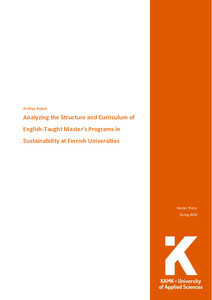Analyzing the Structure and Curriculum of English-Taught Master's Programs in Sustainability at Finnish Universities
Anjum, Arshiya (2023)
Anjum, Arshiya
2023
All rights reserved. This publication is copyrighted. You may download, display and print it for Your own personal use. Commercial use is prohibited.
Julkaisun pysyvä osoite on
https://urn.fi/URN:NBN:fi:amk-2023060421047
https://urn.fi/URN:NBN:fi:amk-2023060421047
Tiivistelmä
Sustainability has emerged as a critical field of study in response to global environmental and societal challenges. With the increasing urgency to address global sustainability challenges, higher education plays a crucial role in preparing students with the necessary knowledge, skills, and attitudes to become active contributors to attain sustainable development goals for a sustainable future. English-Taught Master's Programs in Sustainability offered by Finnish universities are examined, and their structure and curriculum are thoroughly analyzed using inductive approach. The collected data is organized according to key themes and sub-themes, shedding light on the specific areas of focus within these programs. The findings reveal a diverse range of themes and sub-themes in the analyzed programs, including sustainability management, circular economy, renewable energy, leadership, life cycle assessment, business, digitization, culture, and corporate social responsibility. The curriculum encompasses a comprehensive understanding of sustainability, combining theoretical knowledge with practical skills necessary for addressing sustainability challenges in various sectors.
The findings of this study with the literature on sustainability, understanding UNESCO's sustainable development goals, and teaching pedagogies contribute recommendations for master’s degree program in English language, suggestions on what can be developed, areas to focus were discovered and inclusion of courses in current offerings and conclusions were created.
The findings of this study with the literature on sustainability, understanding UNESCO's sustainable development goals, and teaching pedagogies contribute recommendations for master’s degree program in English language, suggestions on what can be developed, areas to focus were discovered and inclusion of courses in current offerings and conclusions were created.
